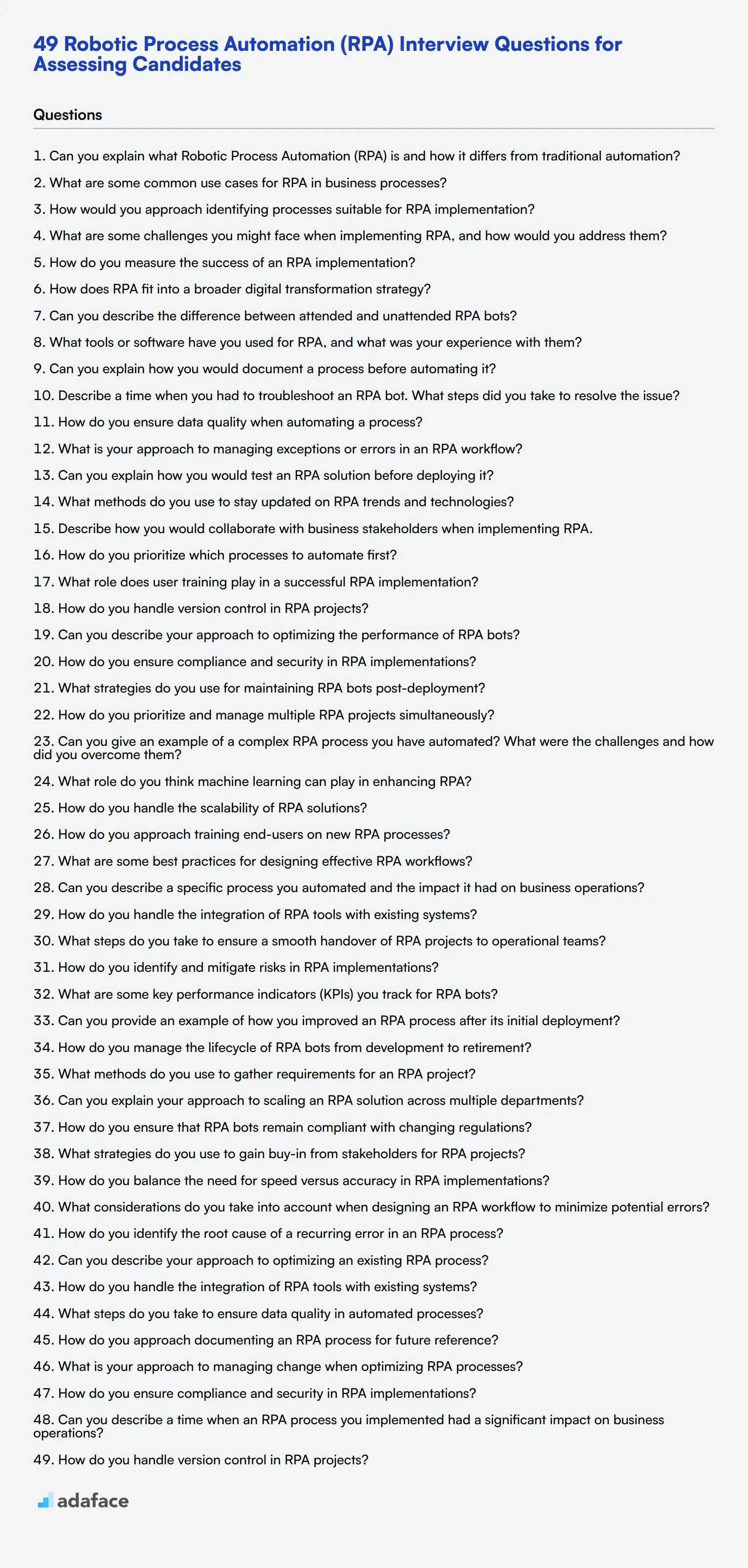As the demand for Robotic Process Automation (RPA) specialists grows, interviewers face the challenge of identifying top talent in this field. Asking the right questions during interviews is crucial to assess candidates' knowledge, skills, and potential fit for RPA roles.
This blog post provides a comprehensive list of RPA interview questions tailored for different experience levels and areas of expertise. From general RPA concepts to specific process-related inquiries, these questions will help you evaluate candidates thoroughly.
By using these questions, you can make informed hiring decisions and build a strong RPA team. Consider complementing your interview process with an RPA skills assessment to get a well-rounded view of candidates' capabilities.
Table of contents
7 general Robotic Process Automation (RPA) interview questions and answers to assess candidates
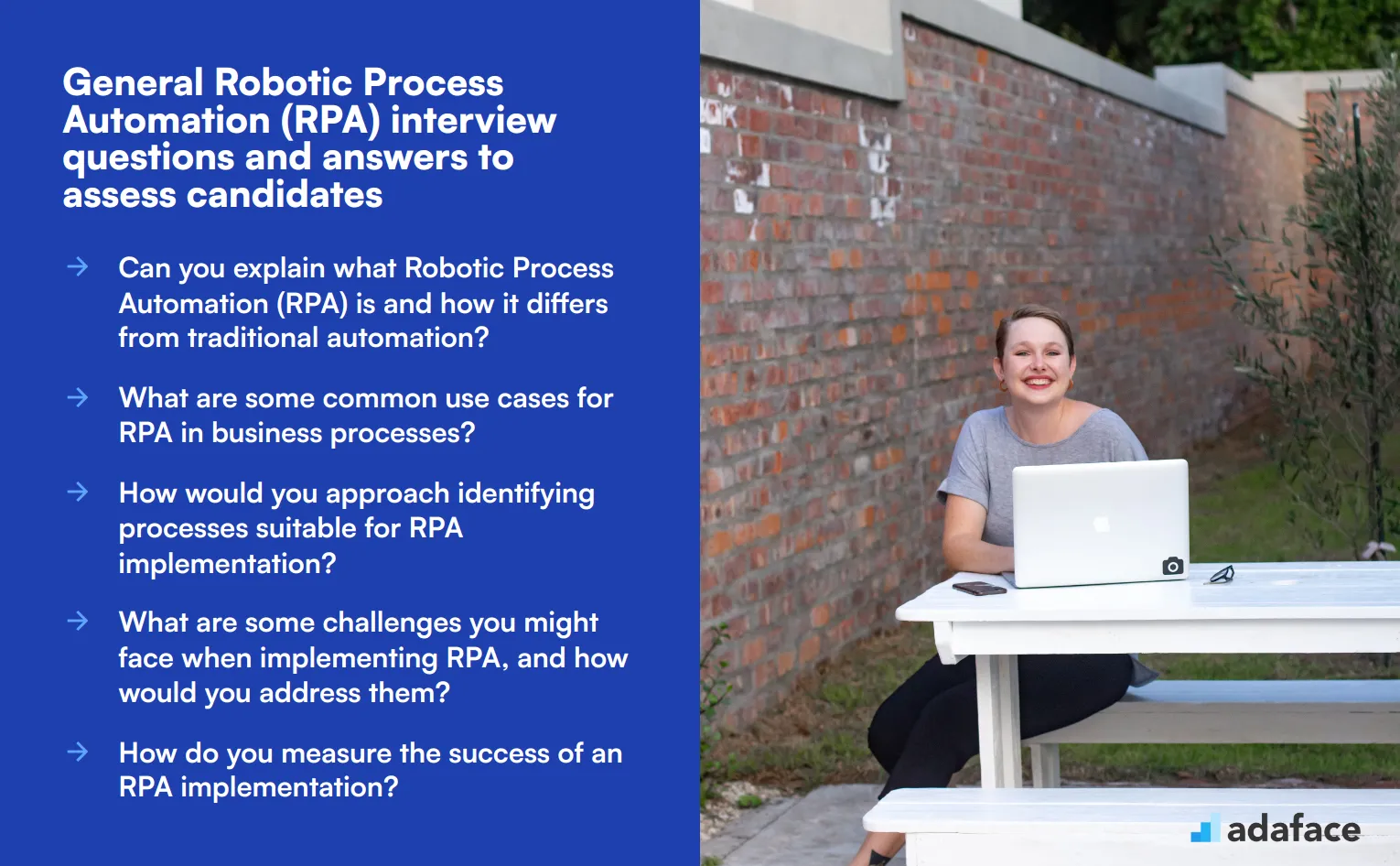
Ready to dive into the world of Robotic Process Automation (RPA)? These seven general RPA interview questions will help you assess candidates' understanding of this game-changing technology. Use them to spark insightful discussions and gauge a candidate's practical knowledge and problem-solving skills in RPA.
1. Can you explain what Robotic Process Automation (RPA) is and how it differs from traditional automation?
RPA is a technology that uses software robots or 'bots' to automate repetitive, rule-based tasks typically performed by humans. Unlike traditional automation, RPA operates at the user interface level, mimicking human actions to interact with applications and systems.
A strong candidate should emphasize that RPA is non-invasive, doesn't require changes to existing systems, and can be implemented relatively quickly. They might also mention that RPA is particularly suited for processes that are repetitive, high-volume, and rule-based.
2. What are some common use cases for RPA in business processes?
Candidates should be able to provide several examples of RPA applications across different business functions. Some common use cases include:
- Finance: invoice processing, accounts payable/receivable, financial reporting
- Human Resources: employee onboarding, payroll processing, leave management
- Customer Service: data entry, order processing, complaint handling
- IT: system monitoring, batch processing, data migration
- Supply Chain: inventory management, procurement, logistics tracking
Look for candidates who can explain how RPA benefits these processes, such as increased accuracy, faster processing times, and reduced costs. They should also be able to discuss potential challenges in implementing RPA for these use cases.
3. How would you approach identifying processes suitable for RPA implementation?
A strong answer should outline a systematic approach to process evaluation. Key steps might include:
- Analyzing current processes to identify repetitive, rule-based tasks
- Assessing the volume and frequency of these tasks
- Evaluating the stability and standardization of the processes
- Considering the potential ROI of automation
- Checking for any regulatory or compliance issues
Look for candidates who emphasize the importance of collaborating with business units to understand processes thoroughly. They should also mention the need to consider the scalability and long-term benefits of automating each process.
4. What are some challenges you might face when implementing RPA, and how would you address them?
Candidates should be aware of common RPA implementation challenges and have strategies to address them. Some key points they might mention include:
- Resistance to change: Address through clear communication and employee training
- Process standardization: Ensure processes are well-documented and optimized before automation
- Bot maintenance: Implement robust monitoring and update processes
- Security concerns: Develop strong governance and access control policies
- Integration with legacy systems: Use RPA tools with broad compatibility or consider API integrations
An ideal response would demonstrate a proactive approach to anticipating and mitigating these challenges, showing the candidate's experience with real-world RPA implementations.
5. How do you measure the success of an RPA implementation?
A comprehensive answer should cover both quantitative and qualitative metrics for evaluating RPA success. Key performance indicators (KPIs) might include:
- Cost savings: Reduction in operational costs
- Time savings: Decreased processing times
- Accuracy improvement: Reduction in errors
- ROI: Financial return on the RPA investment
- Employee satisfaction: Improved job satisfaction due to reduced repetitive tasks
- Customer satisfaction: Faster response times and improved service quality
Look for candidates who understand the importance of establishing baseline measurements before implementation and continuously monitoring these metrics post-implementation. They should also recognize that success metrics may vary depending on the specific process and business objectives.
6. How does RPA fit into a broader digital transformation strategy?
A strong answer should position RPA as a key component of digital transformation, but not the only solution. Candidates might discuss:
- RPA as a starting point for automating legacy processes
- The role of RPA in freeing up human resources for more strategic work
- How RPA can be combined with other technologies like AI and machine learning for more advanced automation
- The importance of aligning RPA initiatives with overall business strategy and goals
Look for candidates who can articulate a holistic view of digital transformation, understanding that RPA is one tool among many in the digital toolkit. They should emphasize the need for a strategic approach that considers process optimization, change management, and long-term scalability.
7. Can you describe the difference between attended and unattended RPA bots?
Candidates should be able to clearly differentiate between these two types of RPA bots:
- Attended bots: Work alongside humans, typically triggered by user actions. They're often used for front-office tasks that require some human intervention.
- Unattended bots: Operate independently without human intervention, usually for back-office processes that can be fully automated.
Look for answers that discuss the appropriate use cases for each type, such as attended bots for customer service scenarios and unattended bots for batch processing. Candidates should also understand that many RPA implementations use a combination of both types for optimal efficiency.
10 Robotic Process Automation (RPA) interview questions to ask junior specialists
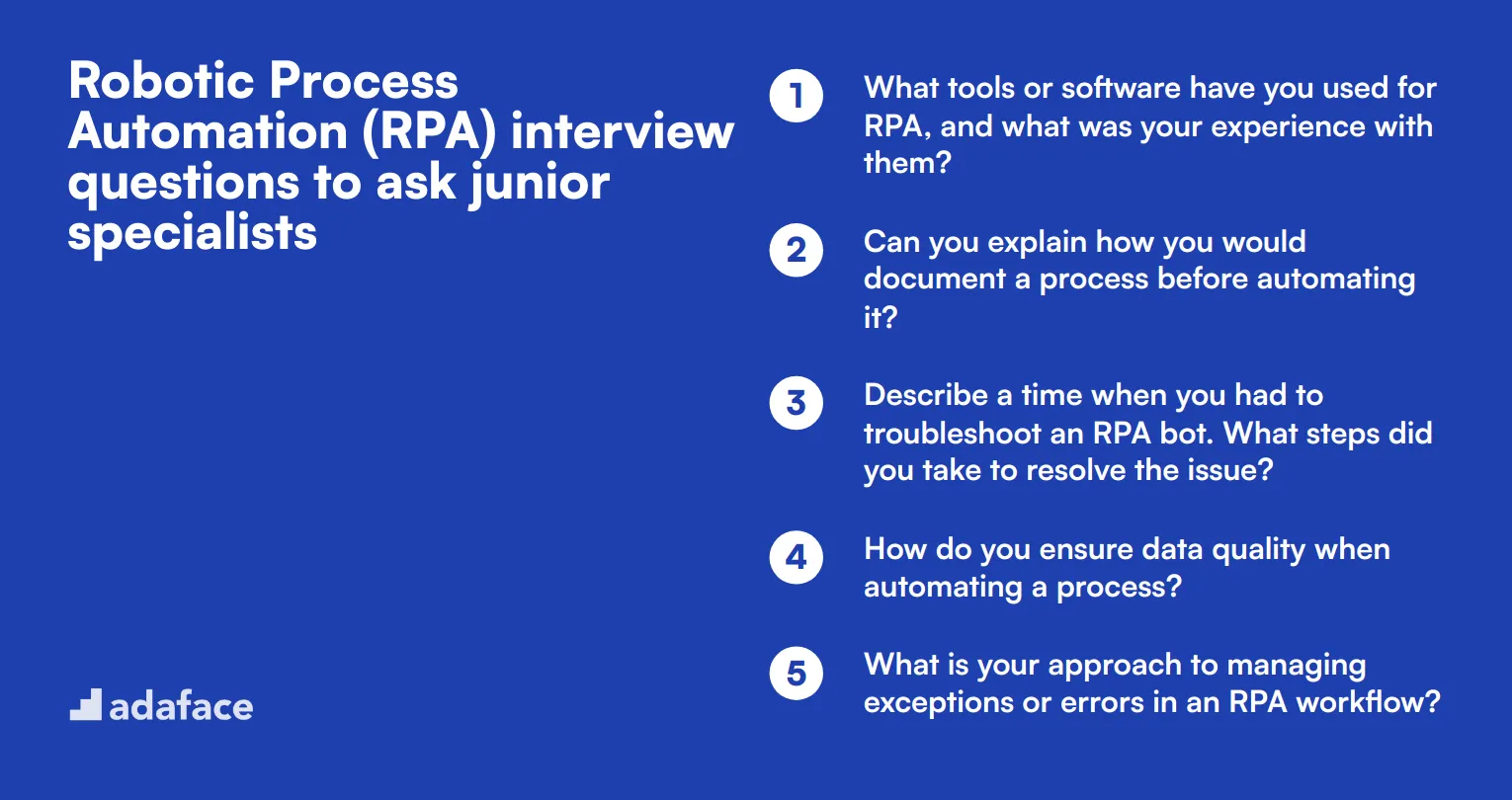
To assess whether junior candidates grasp the essential skills and concepts of Robotic Process Automation, consider using this list of interview questions. These inquiries will help you evaluate their understanding of RPA tools and practical applications within your organization, ensuring a stronger fit for the role. For more insights, check our automation engineer job description.
- What tools or software have you used for RPA, and what was your experience with them?
- Can you explain how you would document a process before automating it?
- Describe a time when you had to troubleshoot an RPA bot. What steps did you take to resolve the issue?
- How do you ensure data quality when automating a process?
- What is your approach to managing exceptions or errors in an RPA workflow?
- Can you explain how you would test an RPA solution before deploying it?
- What methods do you use to stay updated on RPA trends and technologies?
- Describe how you would collaborate with business stakeholders when implementing RPA.
- How do you prioritize which processes to automate first?
- What role does user training play in a successful RPA implementation?
10 intermediate Robotic Process Automation (RPA) interview questions and answers to ask mid-tier specialists
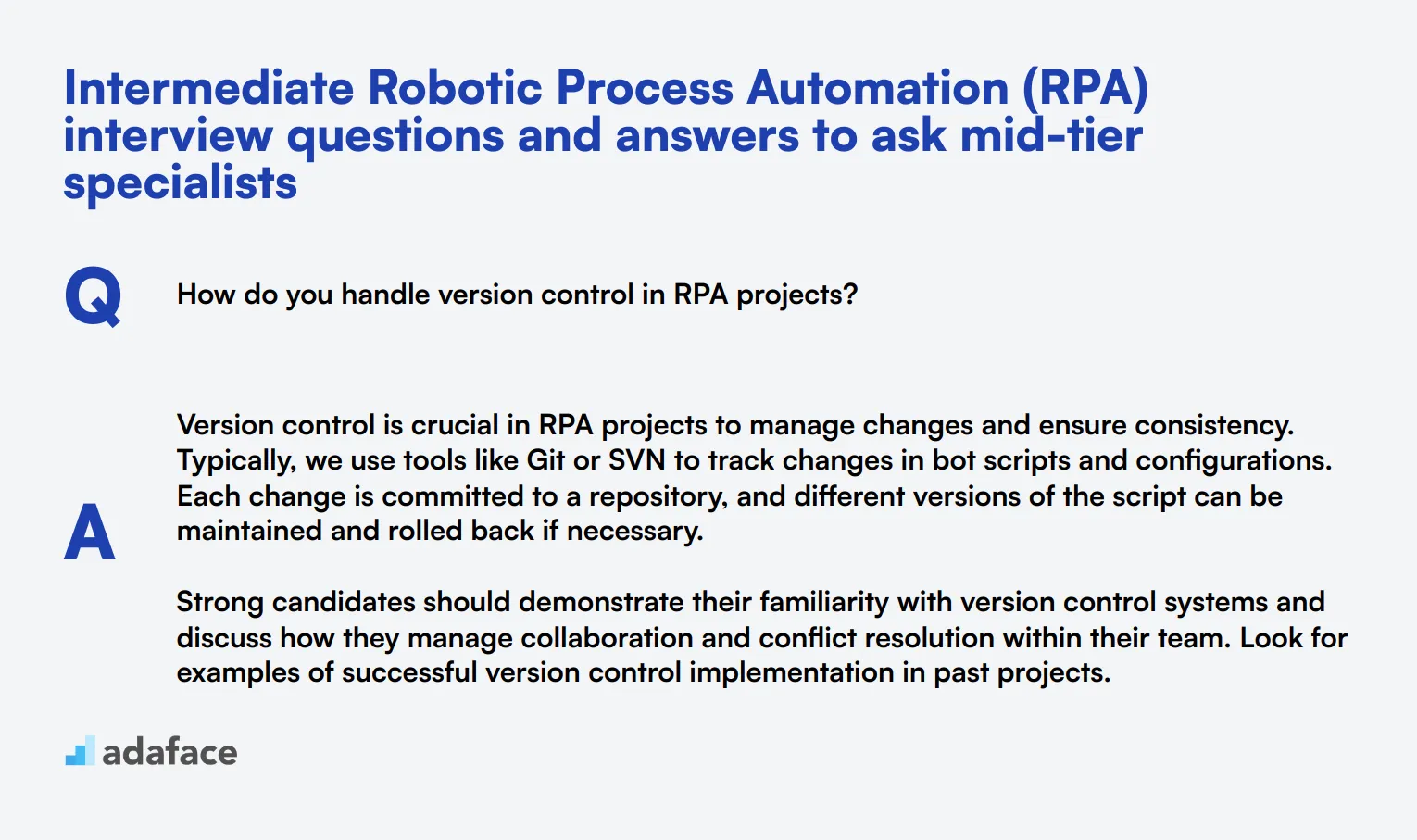
To determine whether your applicants have the right blend of skills and experience for mid-tier RPA roles, ask them some of these 10 intermediate RPA interview questions. These questions will help you gauge their practical knowledge and problem-solving abilities essential for effective RPA implementation.
1. How do you handle version control in RPA projects?
Version control is crucial in RPA projects to manage changes and ensure consistency. Typically, we use tools like Git or SVN to track changes in bot scripts and configurations. Each change is committed to a repository, and different versions of the script can be maintained and rolled back if necessary.
Strong candidates should demonstrate their familiarity with version control systems and discuss how they manage collaboration and conflict resolution within their team. Look for examples of successful version control implementation in past projects.
2. Can you describe your approach to optimizing the performance of RPA bots?
Optimizing RPA bot performance involves several strategies, such as minimizing bot idle time, optimizing scripts for speed, and ensuring efficient utilization of system resources. Regular performance monitoring and tweaking the bot's workflow can also help in maintaining optimal performance.
Ideal candidates will provide specific examples of how they monitored and improved bot performance in previous roles, showing their proactive approach to maintaining system efficiency.
3. How do you ensure compliance and security in RPA implementations?
Ensuring compliance and security in RPA involves adhering to company policies and industry regulations. This includes encrypting data, using secure access controls, and conducting regular audits. Additionally, we ensure that bots handle sensitive data appropriately and are compliant with standards like GDPR or HIPAA, if applicable.
Candidates should highlight their understanding of security protocols and provide examples of how they've implemented these measures in past projects. Look for a proactive approach to identifying and mitigating security risks.
4. What strategies do you use for maintaining RPA bots post-deployment?
Post-deployment, it's essential to have a maintenance plan that includes regular monitoring, updates, and bug fixes. I usually set up alerts for any performance issues and conduct periodic reviews to ensure the bot is functioning as expected. Additionally, keeping documentation updated is crucial for ongoing maintenance.
Look for candidates who emphasize the importance of continuous improvement and proactive maintenance. They should be able to provide examples of how they've effectively maintained bots in their previous roles.
5. How do you prioritize and manage multiple RPA projects simultaneously?
Prioritizing multiple RPA projects involves assessing the business impact, resource availability, and project deadlines. I use project management tools to keep track of progress and ensure clear communication among stakeholders. Time management and efficient resource allocation are key to handling multiple projects effectively.
Candidates should demonstrate their ability to juggle multiple tasks and provide examples of successful project management. Look for strong organizational skills and the ability to set clear priorities.
6. Can you give an example of a complex RPA process you have automated? What were the challenges and how did you overcome them?
One complex process I automated was the end-to-end processing of customer invoices. The challenges included handling various invoice formats and integrating with multiple backend systems. I overcame these by using advanced OCR technology and developing robust error-handling mechanisms to ensure data accuracy.
Candidates should provide detailed examples and discuss the specific challenges they faced and the innovative solutions they implemented. This will show their problem-solving skills and technical acumen.
7. What role do you think machine learning can play in enhancing RPA?
Machine learning can significantly enhance RPA by enabling bots to make data-driven decisions and learn from patterns. For instance, ML can be used to improve data extraction accuracy in document processing or to predict and automate routine tasks based on historical data.
Look for candidates who can articulate specific use cases and demonstrate an understanding of how integrating machine learning can add value to RPA initiatives.
8. How do you handle the scalability of RPA solutions?
To handle scalability, I design RPA solutions with modularity and flexibility in mind. This involves creating reusable components and ensuring the infrastructure can support increased bot activity. Additionally, regular performance testing and monitoring are essential to scale effectively.
Candidates should provide examples of how they've scaled RPA solutions in the past and discuss their approach to ensuring scalability. This demonstrates their foresight and strategic planning abilities.
9. How do you approach training end-users on new RPA processes?
Training end-users involves creating comprehensive documentation, conducting hands-on training sessions, and providing ongoing support. I also develop user-friendly interfaces and ensure that users understand the benefits and limitations of the RPA processes.
Ideal candidates will emphasize the importance of clear communication and user empowerment. Look for examples of successful training initiatives and how they measured their effectiveness.
10. What are some best practices for designing effective RPA workflows?
Some best practices for designing effective RPA workflows include keeping the design simple, modular, and easy to maintain. It's crucial to document each step, ensure robust error handling, and involve business stakeholders in the design process to align with business requirements.
Candidates should highlight their experience with designing scalable and efficient workflows. Look for a structured approach and attention to detail in their responses.
13 Robotic Process Automation (RPA) questions related to processes and tasks
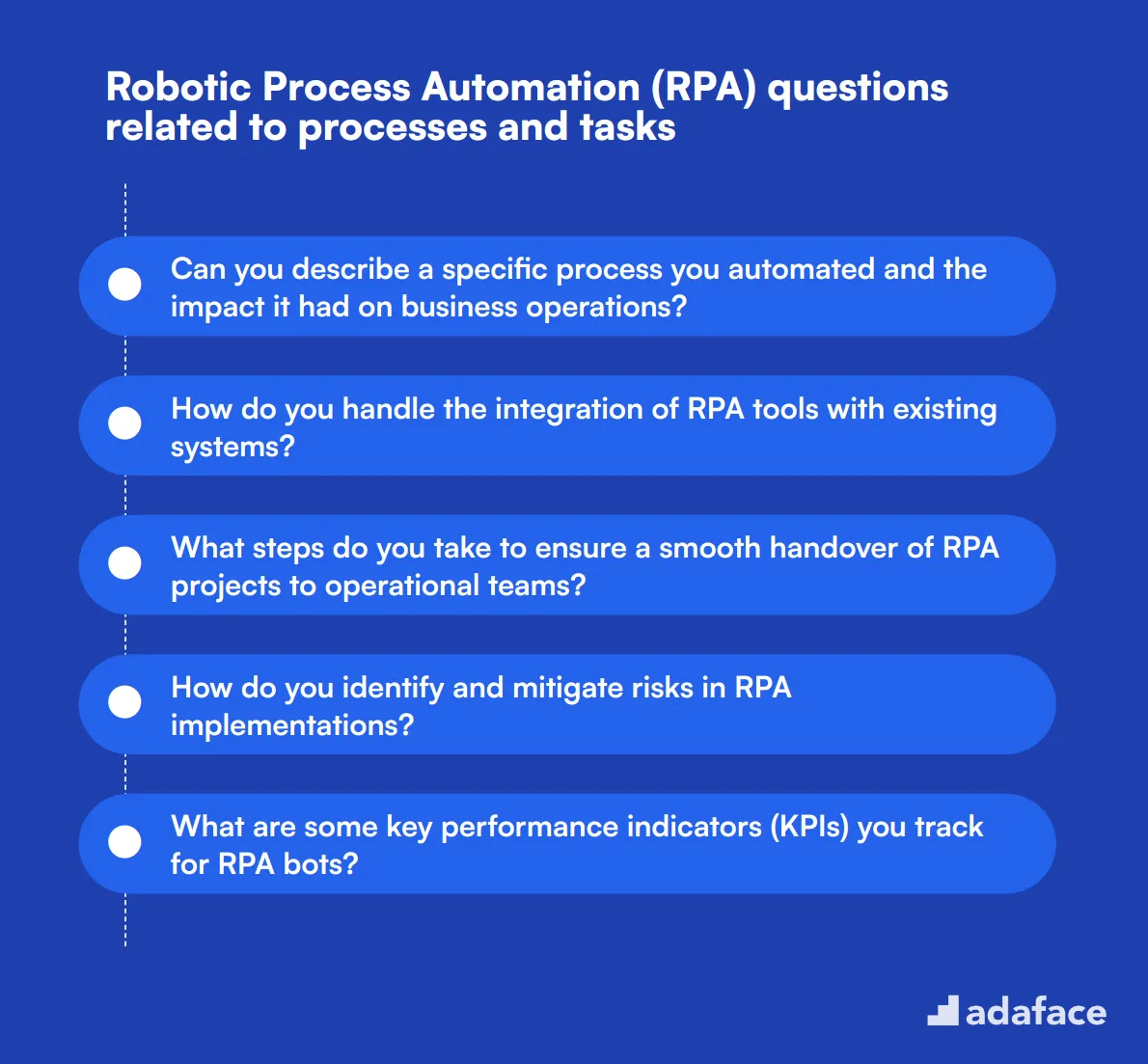
To evaluate whether candidates possess the necessary skills to handle Robotic Process Automation tasks effectively, consider asking these insightful questions. This list focuses on real-world processes and tasks, helping you identify individuals who can not only implement but also optimize and troubleshoot RPA solutions.
- Can you describe a specific process you automated and the impact it had on business operations?
- How do you handle the integration of RPA tools with existing systems?
- What steps do you take to ensure a smooth handover of RPA projects to operational teams?
- How do you identify and mitigate risks in RPA implementations?
- What are some key performance indicators (KPIs) you track for RPA bots?
- Can you provide an example of how you improved an RPA process after its initial deployment?
- How do you manage the lifecycle of RPA bots from development to retirement?
- What methods do you use to gather requirements for an RPA project?
- Can you explain your approach to scaling an RPA solution across multiple departments?
- How do you ensure that RPA bots remain compliant with changing regulations?
- What strategies do you use to gain buy-in from stakeholders for RPA projects?
- How do you balance the need for speed versus accuracy in RPA implementations?
- What considerations do you take into account when designing an RPA workflow to minimize potential errors?
9 Robotic Process Automation (RPA) interview questions and answers related to processes
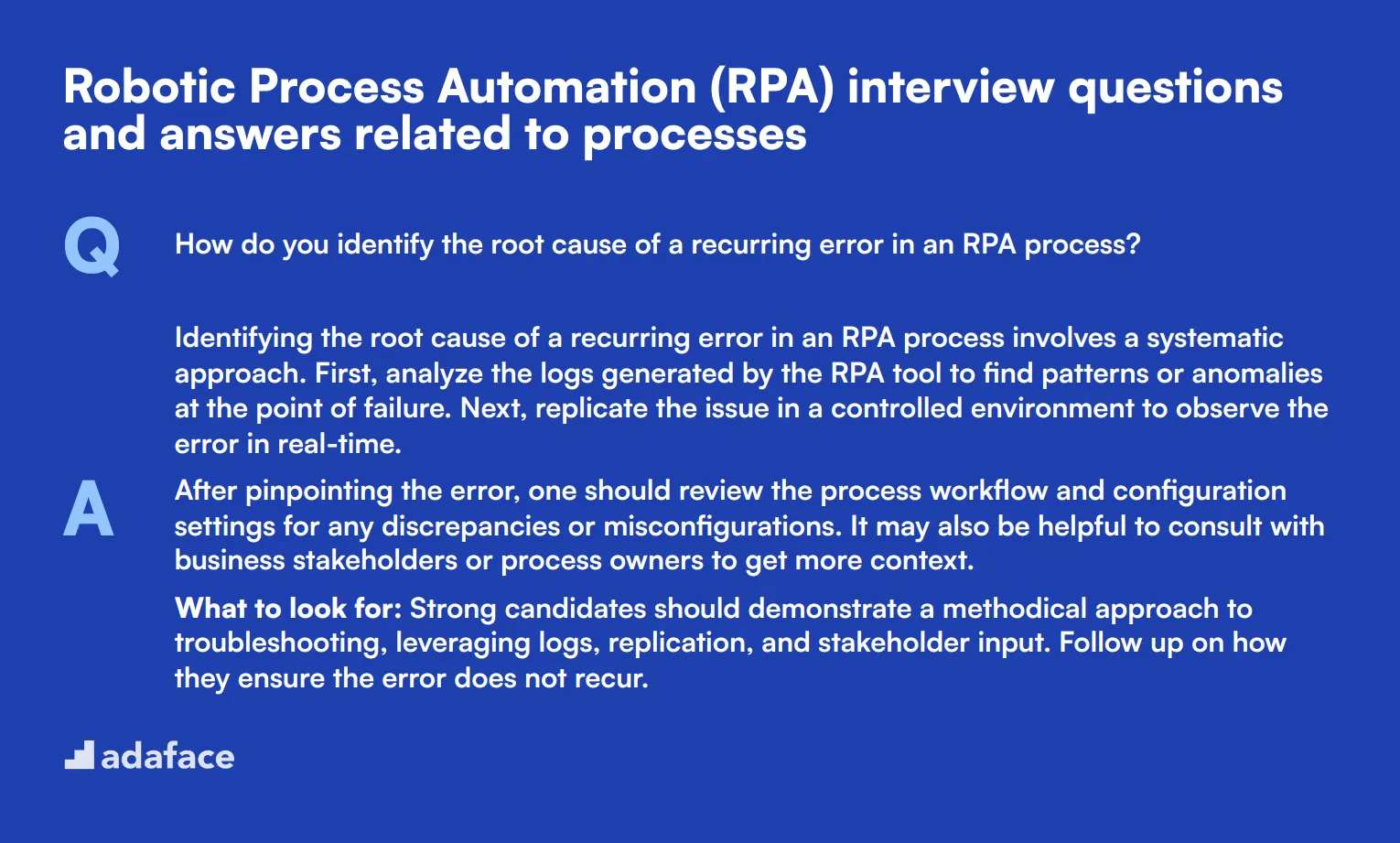
To determine whether your applicants have a solid understanding of managing and optimizing RPA processes, ask them some of these key questions. These questions will help you gauge their practical knowledge and problem-solving skills in real-world scenarios.
1. How do you identify the root cause of a recurring error in an RPA process?
Identifying the root cause of a recurring error in an RPA process involves a systematic approach. First, analyze the logs generated by the RPA tool to find patterns or anomalies at the point of failure. Next, replicate the issue in a controlled environment to observe the error in real-time.
After pinpointing the error, one should review the process workflow and configuration settings for any discrepancies or misconfigurations. It may also be helpful to consult with business stakeholders or process owners to get more context.
What to look for: Strong candidates should demonstrate a methodical approach to troubleshooting, leveraging logs, replication, and stakeholder input. Follow up on how they ensure the error does not recur.
2. Can you describe your approach to optimizing an existing RPA process?
Optimizing an existing RPA process starts with a thorough assessment of the current workflow to identify inefficiencies or bottlenecks. This might involve process mapping and time-motion studies to understand where delays or errors occur.
Next, candidates should suggest specific enhancements, such as simplifying tasks, reducing handoffs, or incorporating more advanced RPA features like machine learning for better decision-making. Continuous monitoring and iterative improvements are key to maintaining an optimized process.
What to look for: Look for candidates who emphasize a data-driven approach to optimization and can provide examples of past improvements. Ask for metrics they use to measure success.
3. How do you handle the integration of RPA tools with existing systems?
Integrating RPA tools with existing systems often requires a clear understanding of both the RPA software and the systems in place. The first step is to ensure compatibility by assessing the API or interface capabilities of the systems involved.
After compatibility is confirmed, candidates should outline a phased approach for integration, starting with a pilot test in a controlled environment before full deployment. Proper documentation and stakeholder communication are crucial throughout this process.
What to look for: Candidates should demonstrate a structured approach to integration, including risk management and stakeholder involvement. Inquire how they handle unexpected integration issues.
4. What steps do you take to ensure data quality in automated processes?
Ensuring data quality in automated processes starts with validation checks at multiple stages of the workflow. Candidates should explain the use of data validation rules and error-handling mechanisms to catch and correct inaccuracies early.
Additionally, they should emphasize the importance of regular audits and reconciliations to maintain data integrity over time. Implementing monitoring tools to track data quality metrics can also be beneficial.
What to look for: Look for candidates who prioritize proactive and continuous data quality measures. Follow up on specific tools and techniques they have used in the past for data validation and monitoring.
5. How do you approach documenting an RPA process for future reference?
Documenting an RPA process involves creating comprehensive and clear documentation that covers every step of the workflow. This includes process maps, detailed descriptions of each task, and any exception handling procedures.
Candidates should also mention the importance of keeping documentation up-to-date with any changes or optimizations made to the process. Including screenshots, flowcharts, and regular review cycles can enhance the documentation quality.
What to look for: Strong candidates should emphasize clarity and thoroughness in their documentation. Ask for examples of documentation they have created and how they ensured its accuracy and usefulness.
6. What is your approach to managing change when optimizing RPA processes?
Managing change when optimizing RPA processes requires a structured change management strategy. This includes stakeholder communication, training, and phased implementation to minimize disruption.
Candidates should outline their approach to gaining stakeholder buy-in, preparing detailed change plans, and providing adequate training and support to users. Continuous feedback loops are essential for refining the changes post-implementation.
What to look for: Look for candidates who can demonstrate effective change management practices, including clear communication, training plans, and stakeholder engagement strategies. Follow up on how they measure the success of the changes.
7. How do you ensure compliance and security in RPA implementations?
Ensuring compliance and security in RPA implementations involves several layers of protection. Candidates should mention regular security audits, adherence to data protection regulations, and implementing robust access controls.
They should also emphasize the importance of ongoing monitoring and updates to security protocols as new threats emerge. Proper encryption and secure data handling practices are essential components of a secure RPA environment.
What to look for: Candidates should exhibit a comprehensive understanding of security best practices and compliance requirements. Ask about specific measures they have implemented in previous RPA projects.
8. Can you describe a time when an RPA process you implemented had a significant impact on business operations?
Candidates should be able to provide a specific example where an RPA process significantly improved business operations. This might include metrics like time saved, error reduction, or cost savings.
They should describe the initial problem, their approach to automating the process, and the tangible benefits realized post-implementation. Highlighting stakeholder feedback and any follow-up optimizations adds depth to their example.
What to look for: Look for candidates who can clearly articulate the problem, solution, and impact of their RPA implementation. Follow up on how they measured success and any lessons learned from the project.
9. How do you handle version control in RPA projects?
Handling version control in RPA projects involves maintaining a repository of different versions of the workflows and scripts. Candidates should mention using version control systems like Git to track changes and collaborate with team members.
They should also highlight the importance of regularly updating documentation to reflect the current version and ensuring backward compatibility when necessary. Clear versioning practices help in troubleshooting and future enhancements.
What to look for: Candidates should demonstrate familiarity with version control systems and their practical application in RPA projects. Ask about their experience with specific tools and any challenges faced in maintaining version control.
Which Robotic Process Automation (RPA) skills should you evaluate during the interview phase?
Assessing every aspect of a candidate's suitability in a single interview is challenging, but you can focus on a few core skills to gauge their proficiency in Robotic Process Automation (RPA). These specific skills provide a strong foundation for understanding a candidate's capability and potential fit for your team.
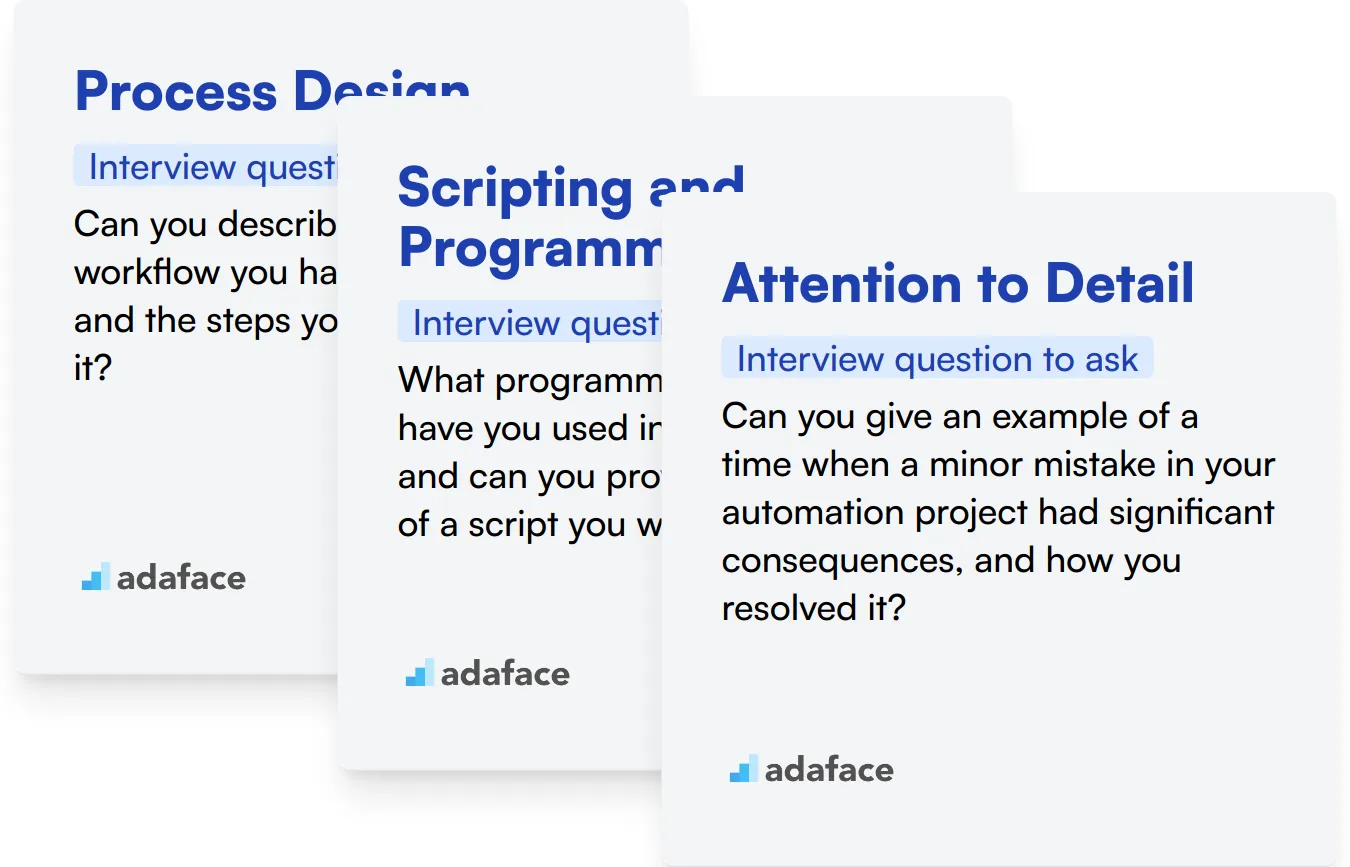
Process Design
Process design is crucial in RPA as it involves creating efficient workflows that bots will follow. A well-designed process ensures that automation is both effective and scalable.
You may use an assessment test with relevant MCQs to evaluate a candidate's grasp of process design. Consider reviewing our RPA skills test for this purpose.
During the interview, you can ask targeted questions to judge the candidate's understanding and experience with process design.
Can you describe a complex workflow you have automated and the steps you took to design it?
Look for detailed responses that show a strong understanding of workflow design, including how the candidate identified inefficiencies and optimized the process.
Scripting and Programming
Scripting and programming skills are essential for creating and managing RPA bots. Candidates should be familiar with languages commonly used in RPA tools, such as Python or VBScript.
An assessment test with relevant MCQs can help filter out candidates who lack necessary programming skills. Our Python skills test could be a good fit for this assessment.
You can ask specific questions to evaluate the candidate's proficiency in scripting and their ability to write and debug code.
What programming languages have you used in RPA projects, and can you provide an example of a script you wrote?
Expect candidates to discuss their experience with specific languages and to provide examples of scripts they have written, reflecting their practical coding skills.
Attention to Detail
Attention to detail is vital in RPA as even small errors in process design or coding can lead to significant issues in automation. Candidates must demonstrate meticulousness in their approach.
You can utilize an assessment test with relevant MCQs to evaluate this skill. Our Attention to Detail test is designed for this purpose.
Ask targeted questions to gauge the candidate's attention to detail and their approach to ensuring accuracy in their work.
Can you give an example of a time when a minor mistake in your automation project had significant consequences, and how you resolved it?
Look for responses that highlight the candidate's awareness of detail and their methodical approach to identifying and rectifying errors.
3 tips for using Robotic Process Automation (RPA) interview questions
Before you start putting what you've learned to use, here are three tips to make the most out of your RPA interview questions.
1. Leverage skill tests before and after candidate sourcing
Using skill tests before conducting interviews helps to filter candidates and ensure you are spending time with the best prospects.
Consider using tests like the Blue Prism Test to evaluate candidates on specific RPA skills. Such tests provide a clear indication of the candidate's practical knowledge.
The benefits are manifold: improved accuracy in candidate selection, reduced time-to-hire, and a more robust understanding of each candidate's capabilities. This ensures a smoother and more efficient interview process.
2. Compile and prioritize interview questions
You don't have a lot of time during interviews, so selecting the right and relevant questions is key to maximizing your evaluation of candidates.
Consider including questions that cover not just technical skills but also other related areas. For example, you might want to include questions from areas like JavaScript or communication, depending on your job requirements.
3. Ask follow-up questions
Just using the prepared interview questions won't be enough; it's crucial to ask follow-up questions to gauge the candidate's depth and honesty.
For instance, if you ask, 'Can you describe how you would automate a manual task using Blue Prism?', follow up with, 'Can you walk me through a specific example from your past experience?' This helps you understand the true depth of the candidate's expertise and how well they match the role requirements.
Evaluate RPA skills using targeted interview questions and assessments
When hiring for RPA roles, it’s important to ensure candidates possess the necessary skills. One of the most effective ways to evaluate these skills is through specialized skill tests such as the Blue Prism Test.
After administering these tests, you can confidently shortlist the best applicants for interviews. To get started, consider signing up on our platform at Adaface to access a wide range of assessments tailored to your hiring needs.
Blue Prism Assessment Test
Download Robotic Process Automation (RPA) interview questions template in multiple formats
Robotic Process Automation (RPA) Interview Questions FAQs
Candidates should be familiar with tools such as UiPath, Blue Prism, Automation Anywhere, and Pega.
Ask them to describe specific RPA projects they've worked on, including the tools used, challenges faced, and outcomes achieved.
Problem-solving, attention to detail, and strong communication skills are crucial for RPA specialists.
Yes, practical tests can help assess a candidate's technical skills and ability to apply their knowledge in real-world scenarios.
Ask questions about their approach to maintaining, scaling, and optimizing RPA solutions, and how they ensure compliance and security.
Lack of specific examples of past RPA work, inability to explain technical concepts clearly, and limited knowledge of RPA tools and methodologies are potential red flags.

40 min skill tests.
No trick questions.
Accurate shortlisting.
We make it easy for you to find the best candidates in your pipeline with a 40 min skills test.
Try for freeRelated posts
Free resources




